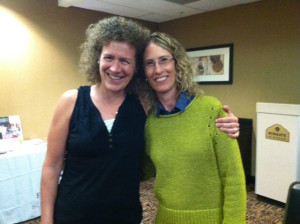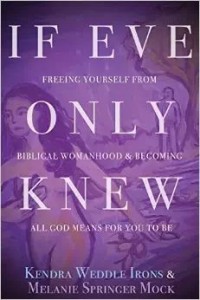“If Eve Only Knew: Finding Hope in the Midst of Change,” workshop facilitated by Kendra Weddle and Melanie Springer Mock at Christian Feminism Today Gathering

In the wake of the horrific violence of the last few weeks, Kendra Weddle raises important questions few others are raising. In the blog “Ain’t I a Woman,” which Kendra co-authors with Melanie Springer Mock, Kendra asks: “Have you noticed the one constant that lies at the heart of the violence we continue to witness? Do you ever wonder why women are seldom the perpetrators of violence and instead are most often the ones who suffer from it?”
As I read Kendra’s blogpost, I thought not only about the widely reported acts of violence, but also of the seldom-reported epidemic of violence against females in our country and around the world. In the U.S. alone, every nine seconds a woman is assaulted or battered. One in three women in the world experiences some kind of abuse in her lifetime. Worldwide, an estimated four million women and girls each year are bought and sold into prostitution, slavery, or marriage. Nicholas Kristof and Sheryl WuDunn write in their book Half the Sky: “More girls have been killed in the last fifty years, precisely because they were girls, than people were killed in all the battles of the twentieth century. More girls are killed in this routine ‘gendercide’ in any one decade than people were slaughtered in all the genocides of the twentieth century.” There are many more alarming statistics on worldwide violence against women and girls. These awful acts of violence are so common that they are seldom even considered newsworthy.
In their blog, their book If Eve Only Knew, their teaching of university students, and their speaking at conferences, Kendra and Melanie not only raise awareness of violence, abuse, and discrimination against women, but also point the way to transforming church and society so that women and all others can become all we’ve created to be in the divine image.
 At the 2016 Christian Feminism Today Gathering, Kendra and Melanie facilitated an empowering workshop titled “If Eve Only Knew: Finding Hope in the Midst of Change.”
At the 2016 Christian Feminism Today Gathering, Kendra and Melanie facilitated an empowering workshop titled “If Eve Only Knew: Finding Hope in the Midst of Change.”
Kendra begins by engaging participants in a conversation about change. She asks us to form circles to explore our feelings about change, about some of today’s challenges that we’re particularly concerned about, about dwindling church attendance, and about characteristics of young people we hear in the media.
To illustrate something about the young people she and Kendra teach, Melanie reads from the introduction of their book If Eve Only Knew: Freeing Yourself from Biblical Womanhood & Becoming All God Means for You to Be. In this excerpt she refers to a previous Christian Feminism Today Conference:
Kendra and I had come to the conference to talk about the effects evangelical popular culture has on the students we teach at our respective colleges. We wanted to help Christian feminists understand what they are up against: a Christian culture that continues to tell women they need to be submissive, silent, docile, and focused not at all on an outside-the-home career, but on raising children and caring for husbands. This was God’s exclusive design for women, and those who followed a different path were outside God’s will.
As professors, Kendra and I work with women excited about their vocations but faced with the pervasive message they’ve often been given by their evangelical upbringing, by their families, their churches, and by Christian popular culture. Our students learn early that women—by virtue of their biological relationship to Eve—are more deceptive, more prone to sin and impurity, more emotional, and less capable of making decisions than their male peers. A woman’s primary role is as a helpmeet, raising children. Lifelong vocations are for the very few women who do not marry. Any vocation involving church leadership is reserved for men no matter what a young woman’s calling.
Given the persistent thrum of these messages, it is little wonder conservative Christian women struggle to find a voice in their church communities and to feel affirmed in their life choices. It’s also no wonder that women graduating from evangelical Christian universities often express less confidence than their male peers, and their sense of vocational call is less clear upon graduation. Women who visit our offices seeking guidance often seem less self-assured about their futures, especially if they haven’t found the “Mrs.” degree they are told is imperative with a conservative Christian college education. . . .
The evangelical blogs, magazines, and books these young women read, the music they listen to, and the organizations to which they belong send clear messages about who or what they should be. And all of it is delivered with the conviction that it’s godly, because “the Bible says so.”
At the 2016 Christian Feminism Today Gathering, Melanie and Kendra offer hope that many young people are rejecting these stifling messages from conservative Christian churches and evangelical popular culture. But many are rejecting church entirely.
Melanie cites statistics showing that millennials, in fact, don’t see themselves as religious. Only 22% report attending church regularly, 70% say that church is irrelevant, and many do not see the church as making an impact on the world. Many churches, in trying to remedy the decline in attendance, have created specific ministries to draw people in based on their “affinity” for certain activities. In evangelical churches, affinity ministries are often based on what a church assumes men and women will enjoy doing. Affinity ministries for men promote hyper “masculinity,” illustrated by a men’s conference titled “Godly Grit: Aching for the Return of Fearless Heroic Manhood” and by a church’s giving away AR-15 assault rifles. Affinity ministries for women include craft nights and teas. To attract more people, many evangelical churches have also adopted a “performance mentality,” staging worship services with flashy lights and music. Millennials, however, are rejecting these performance-based services built on gender stereotypes, such as that men are powerful and independent and that women are relational and emotional. Millennials question gender binaries. Evangelical church leaders deride tolerance and promote exclusive theologies, whereas millennials embrace diversity and seek inclusion and unity. The hopeful word is that many young people are rejecting these theologies of exclusion. Is it possible to create churches where millennials and all people of all ages feel welcome? The hope is that, based on Jesus’s words “I am the vine, you are the branches” (John 15: 5), we can create churches that are radically nonhierarchical, communities of interconnectedness and mutuality.
In the meantime, as we’re living in a hierarchical, patriarchal culture, the story of Tamar may prove hopeful. In the workshop Kendra uses feminist teaching methods to draw out the collective wisdom of participants, asking us to explore these questions in circle conversations on the story of Tamar in Genesis 38: What do you find interesting? Are there aspects about the narrative you find problematic? Is there anything encouraging here? Our circle had a wonderful conversation about the strictures of the patriarchal culture in which Tamar lives, about how our patriarchal culture still stifles us, and about Tamar’s amazing ability not only to survive but to exercise her own agency in securing justice for herself in a patriarchal world. In If Eve Only Knew, Kendra comments on this text: “People usually see this narrative through a lens of sexuality and incest when reading it for the first time. Yet sexual encounter is not the prism through which the author encouraged his readers to look. Rather, sex was merely the means Tamar used to establish justice when the patriarchal world denied what she rightly should have received. . . . Tamar holds the key to this complex story by shifting our attention from the presumed major character Judah, and the assumptions that go along with reading from a perspective of privilege. In doing so, we can see Tamar’s courage and initiative.”
In their Christian Feminism Today workshop, as in their blog and book, Kendra and Melanie offer hope in the midst of our changing world, hope that together we will embrace our full humanity to become all we’re meant to be in the divine image. Their liberating message points the way out of our violent culture to Wisdom’s paths of peace and justice (Proverbs 3:13-17). They conclude If Eve Only Knew with these words: “Wisdom Woman stands in our midst, too, inviting us to be all we are meant to be.”

Dr. Kendra Weddle is associate professor and chair of Religion and Humanities at Texas Wesleyan University in Fort Worth, Texas, and blogs with Dr. Melanie Springer Mock at Ain’t I a Woman: De/Constructing Christian Images . Motivated by injustice within the church, Kendra seeks to challenge the status quo—in her teaching and writing—especially with an eye for how the church can move beyond its sexism. Her most recent book is in collaboration with Melanie Springer Mock: If Eve Only Knew: Freeing Yourself from Biblical Womanhood and Becoming All You are Meant to Be (Chalice Press, 2015). Her first book—Preaching on the Plains: Methodist Women Preachers in Kansas, 1920-1956 (University Press of American, 2007)—examines United Methodist Women who preached in Kansas prior to 1956. In addition, Kendra is a frequent contributor to Christian Feminism Today.

Dr. Melanie Springer Mock is a professor of English at George Fox University in Newberg, Oregon. A prolific author, Melanie’s essays have appeared in Christian Feminism Today, The Nation, Adoptive Families, Mennonite World Review, the Chronicle of Higher Education, and the Oregonian, among other places. In 2003, Cascadia Publishing House published her book, Writing Peace: The Unheard Voices of Great War Mennonite Objectors. And in 2011, Barclay Press published Just Moms: Conveying Justice in an Unjust World, a collection that Melanie co-edited with Rebekah D. Schneiter. Melanie is also the other half of the writing team on If Eve Only Knew and Ain’t I a Woman: De/Constructing Christian Images, taking turns with Kendra in posting thought-provoking, challenging, funny, and always engaging posts several times a week.

This is so powerful. I never thought of all that we’re going through in the world as “changes” but how beautifully hopeful that is! I didn’t know the statistics on the enslavement and violence on women and girls. We have to save them all!!! Thank you, all three of you for helping our culture change for the better! ?
Thank you for your comment. Yes, the violence against women and girls is horrific. But there is hope for change, and we’re contributing to it. You’re saving and empowering females through your marvelous Free Sophia blog: https://plus.google.com/107287050579003737566/posts